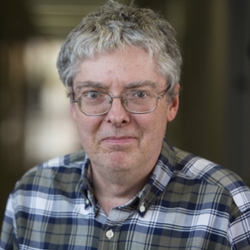
Our lab is investigating the molecular and cellular mechanisms of circadian rhythms, which have periods of approximately 24 hours and are found in both unicellular and multicellular organisms. For example, human sleep/wake behavior is a circadian rhythm. While responsive to light and temperature cues, circadian rhythms are known to be generated within the organism because they persist under constant environmental conditions. Recently, there have been major advances in our understanding of the underlying cellular and molecular mechanisms that generate these “endogenous clocks”. These advances have been possible because of genetic approaches, which require the isolation and analysis of mutations affecting circadian rhythms. Our research has identified several such mutations in the model organism Drosophila melanogaster, which is perhaps the most well developed metazoan genetic system. Molecular cloning of the Drosophilaclock genes has demonstrated that two of these genes regulate their own rhythmic expression. Other mutations have identified circadian transcription factors, photoreceptors and a protein kinase, which is the principal focus of our work. Using a combination of genetic, biochemical and immunocytochemical approaches, our lab is investigating how all of these components interact with the protein kinase to produce a functional clock. We also are investigating the role of this protein kinase in vertebrate clocks, which have a mechanism similar to the Drosophila one.